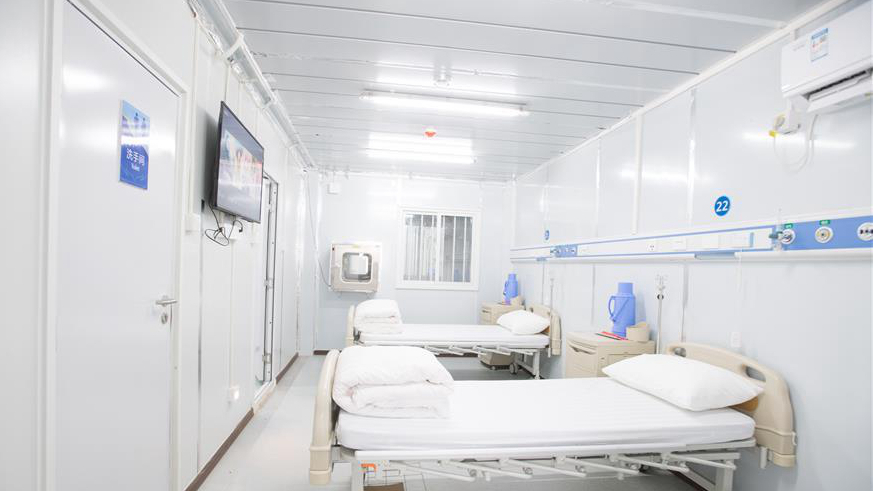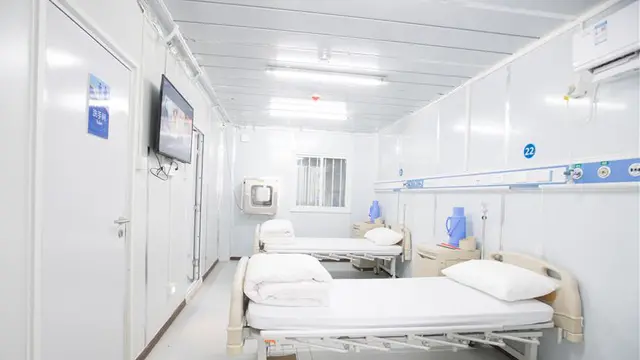02:44

After more than three months of arduous fight, Wuhan, the Chinese city once hardest hit by the coronavirus outbreak, cleared all COVID-19 cases in hospitals late April. ICU doctor Du Bin knows exactly what it means and what it takes.He was one of the earliest professional to come to Wuhan's aid in January. As the ICU director at PekingUnionMedical College Hospital, Dr. Du played a crucial role in tackling huge amount of seriously-ill patients.
Tian Wei: Help us understand how patients are in Wuhan's ICU doing now?
Du Bin: Although all patients in Wuhan have already obtained negative PCR tests of the novel coronavirus, we're still treating some of them for the underlying diseases such as leukemia, lung cancer or cerebrovascular events, such as a stroke. There are still three or four cases on the ECMO, and the total number of cases in the ICU here are around 10 to 20. But I think the local health care resources are enough to care for these patients. So that's why it's time for us to leave Wuhan.
Tian: How does the fatality rate in Wuhan's ICUs compare with the numbers we have seen in other countries? Is it fair to do such comparison at all?
Du: To compare the data in Wuhan with other cities or other countries is very difficult. Because number one, the age of the patient population varies between countries, with the older the population the higher the fatality rate could be. The second factor is that the case definition is not exactly the same across countries. For example some countries count asymptomatic patients, which is not the case in China. Thirdly, there is the problem with the accuracy of PCR testing kits for coronavirus. All these factors plus more make a direct comparison of fatality rates difficult.
Tian: You mentioned the fact that some PCR tests fail to give accurate results. Do we have a number about the accuracy rate?
Du: I'm probably not the right person to provide the answer, but as far as I know, the false negative rate with regards to the PCR test for the novel coronavirus here in Wuhan is approximately 50 percent or even higher.
There are multiple explanations for this. One factor is the technicality issue with getting a proper sample from the patient. You see in the guidance issued by the Ministry of Health, they recommend that you should obtain the sputum of a patient. However as far as we know, the majority of patients, especially in the initial phase, they only develop dry cough without sputum. This means it is very difficult to get the sputum from a patient.
So in some of the cases, we have to perform the nasopharyngeal swab, or oral pharyngeal swab, instead of sputum sample. However, according to our previous experience with the viral pneumonia, taking samples from the upper versus the lower respiratory tract might produce different results.
Tian: Given the fact that, as you said, the tests we have now have very high error rate, how should we understand the mass testing strategies that are being used by governments? Will these tests be able to help make the right policies?
**Du: **Despite the fact that they may give negative, or even false positive results, this is the only way to stop the pandemic.
From what we know, identifying patients and their close contacts is the most important step to take in stopping the spread of the virus so that you can isolate those patients and prevent the disease from spreading to the community. This can only be done by testing, that's why I say that test is the only way, the only approach.
We know that PCR is not perfect, but I should mention that the serology test, which tests for antibodies, might be a good supplement to the PCR test.
Tian: You are on your way to northeast part of China. What is the situation likely to be there?
**Du: **I do not know exactly what is our responsibility is there yet. But I think the current challenge is not the surge of critically ill patients in Suifenhe, but we are there to get prepared. We expect more Chinese citizens to return from Russia, which might mean more cases of COVID-19, whether mild or severe. So right now we are making preparations with regards to the administration, management and medical care.
Tian: With so much still unknown like you said, what kind of danger are we facing?
Du: Currently we have no idea whether the novel coronavirus will come back again or not.
Will it behave like SARS, which can disappear in the next year? Or will it as some of the experts predicted, stay in the whole environment and even in the human body for quite a long time? And will it come back with significant impact, or will it behave like the regular flu?
I think we should still wait and see. Every government should prepare for the possible next surge on all levels, whenever that is, the fall, the winter, or next year. We hope so, yeah.
World Insight with Tian Wei is an international debate/in-depth interview program facilitated by host Tian Wei. People in the know, be they global leaders or emerging change-makers, all provide their insights on this unique global platform.
Schedule: Monday-Saturday
Time (GMT): 1415, 2015
(If you want to contribute and have specific expertise, please contact us at [email protected].)
 简体中文
简体中文














